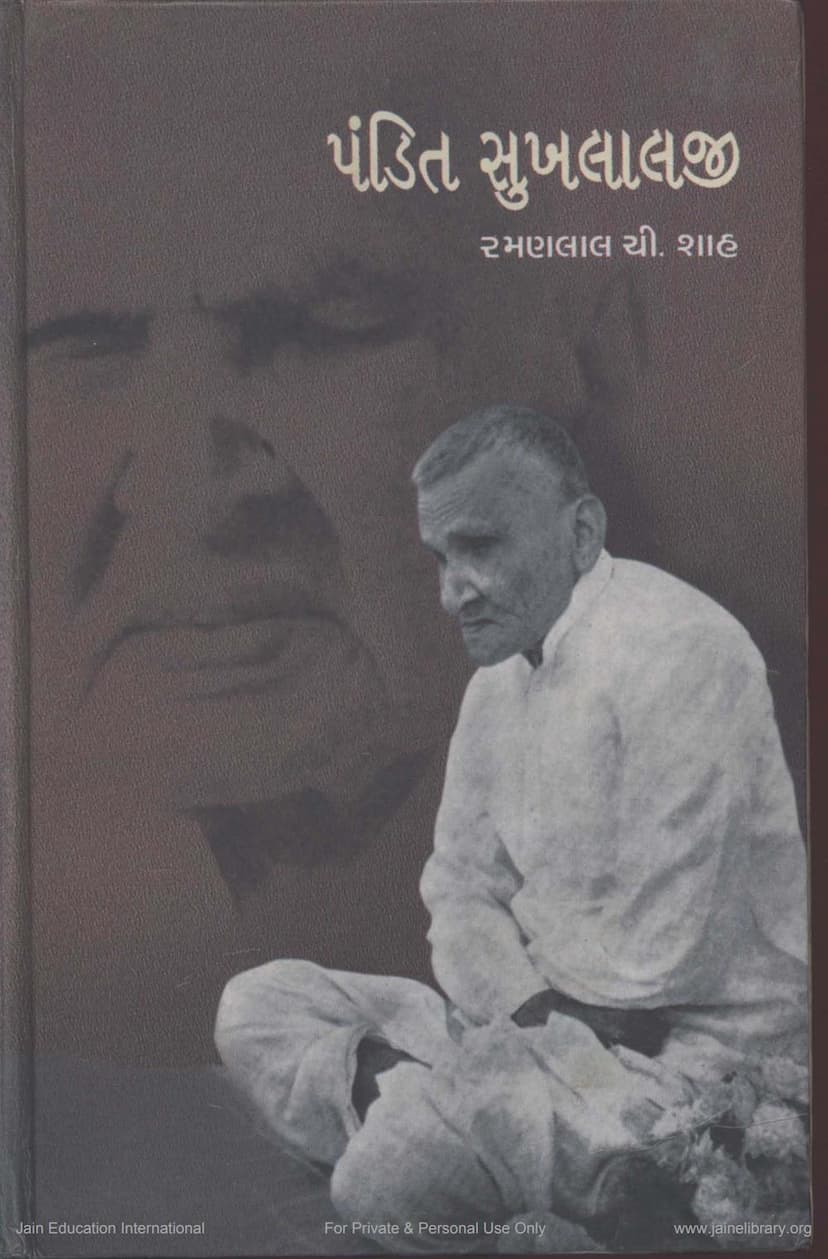Pandita Sukhlalji
Added to library: September 2, 2025

Summary
Here is a comprehensive summary in English of the provided Jain text about Pandit Sukhlalji, based on the provided pages:
Book Title: Pandita Sukhlalji Author: Ramanlal C. Shah Publisher: Gurjar Granthratna Karyalay
This book, published by Gurjar Granthratna Karyalay, is a biography of Pandit Sukhlalji Sanghavi, a prominent Jain scholar and philosopher of the 20th century. Written by Ramanlal C. Shah, the book aims to present a comprehensive account of Panditji's extraordinary life and contributions.
Pandit Sukhlalji: A Visionary Scholar Despite Blindness
The book highlights Pandit Sukhlalji (born December 8, 1880 – passed away March 2, 1978) as a remarkable figure of the 20th century, defying the limitations of his blindness to achieve immense academic and intellectual success. He lost his eyesight at the age of sixteen due to smallpox, a devastating event that profoundly impacted his life and outlook. However, rather than succumbing to despair, Panditji channeled his energy into deep study and intellectual pursuit, becoming a renowned scholar of Indian philosophy, particularly Jainism.
Early Life and Education:
Born in Limli, Saurashtra, Panditji's early life was marked by a thirst for knowledge. Despite his blindness, he demonstrated exceptional memory and intellectual prowess. His early education was in a village school, where he learned basic literacy and numeracy. The loss of his sight led him to seek solace and knowledge in religious texts and teachings, often through listening to Jain monks. His quest for deeper learning took him to Kashi (Varanasi), a renowned center of learning, where he studied Sanskrit language, literature, and various schools of Indian philosophy, including Jain, Vedanta, Nyaya, and others. His dedication and sharp intellect impressed his teachers, enabling him to overcome the challenges of studying without sight.
Academic and Scholarly Contributions:
Panditji's academic career included teaching positions at Banaras Hindu University, where he headed the Prakrit and Jain Philosophy department. He also had significant associations with prominent figures like Mahatma Gandhi at Gujarat Vidyapith and Kanhaiyalal Munshi at Bharatiya Vidya Bhavan in Mumbai. His scholarly output was vast and profound, encompassing extensive research, critical editing, and translation of ancient Jain and other Indian philosophical texts. He is particularly known for his work on significant Jain scriptures like Tattvarthasutra, Sanmatitarka, Karmagrantha, and Panch-pratikraman Sutra.
Overcoming Adversity and Intellectual Prowess:
The book emphasizes Panditji's exceptional willpower and intellectual capabilities. Despite his blindness, he developed extraordinary auditory and memory skills. He could recognize people by their voices and recall details from readings with remarkable accuracy. His interactions with people, his daily routines, and his engagement with various subjects reveal a profound capacity for learning and understanding. He possessed an unwavering commitment to truth and a balanced perspective, capable of analyzing different viewpoints with clarity and fairness.
Personal Life and Philosophy:
Panditji remained unmarried, dedicating his life entirely to scholarship and spiritual pursuit. His life was characterized by simplicity, self-discipline, and selfless service. He embraced a minimalist lifestyle, reflecting the influence of figures like Mahatma Gandhi. His philosophical outlook was inclusive, appreciating the common threads of wisdom across various Indian traditions, while remaining deeply rooted in Jain principles. He believed in the transformative power of knowledge and the importance of right perspective, stating, "Life is not merely about having a body, breathing, knowing through senses, or acting through limbs; it is also about experiencing subtle and subtler feelings in various states of mind and consciousness."
Literary Works:
Panditji authored numerous significant works, including:
- Tattvarthasutra (Gujarati translation and commentary, Hindi translation, and English translation)
- Sanmatitarka (Critical edition and Hindi translation of a major Jain philosophical text)
- Karmagrantha (Hindi translation)
- Panch-pratikraman Sutra (Hindi translation)
- Jain Tarkabhasha (Edited in Hindi)
- Praman Mimansa (Edited in Hindi)
- Jnana Bindu (Edited in Hindi)
- Tatvopaplavasiṁha (Edited)
- Hetubindu Tika (Edited)
- Darshan ane Chintan (Collection of essays in Gujarati)
- Darshan aur Chintan (Collection of essays in Hindi)
- Bharatiya Tattvavidya (Essays on Indian Philosophy)
- Samdarshi Acharya Haribhadra (On the Jain Acharya Haribhadra)
- Maru Jivanvruutt (Autobiography covering up to 1924)
Recognition and Legacy:
Panditji's immense contributions were recognized through numerous honors and accolades, including honorary D.Litt. degrees from various universities, the 'Padma Bhushan' award from the Government of India, and the 'Sahitya Akademi Award' for his work Darshan ane Chintan. His life story is an testament to the power of the human spirit, demonstrating that physical limitations can be overcome through perseverance, intellectual dedication, and unwavering inner strength. He is remembered not just as a scholar but as an institution, a beacon of wisdom and inspiration for generations to come.
The book provides a detailed account of his journey, including his early childhood memories, his struggles with blindness, his interactions with Jain monks, his travels, his academic endeavors in Kashi, his deep philosophical insights, and his final years in Ahmedabad. The author, Ramanlal C. Shah, expresses his personal reverence for Panditji, who was like a father figure to him, and credits Panditji's own autobiography, "Maru Jivanvruutt," along with other biographical works, as key sources for this biography. The book is a tribute to a great soul whose life and work continue to illuminate the path of knowledge and spiritual understanding.